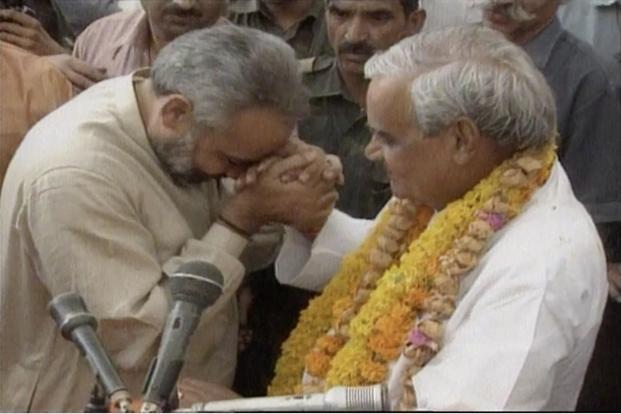The political career of the Nationalist Congress Party’s (NCP) leader Sharad Pawar is at its fag end and it looks like he is planning to retire on an amicable note. Already embroiled in the Rs 25,000-crore Maharashtra State Cooperative Bank (MSCB) scam which dates back to 2012, it might be a meek attempt of him to set the road straight. In an interview with PTI, the NCP leader talked about the difference in working style of Narendra Modi and Atal Bihari Vajpayee. “Vajpayee was a well-cultured gentleman. Modi is an effective person when it comes to executing a programme. Modi has the ability to implement a decision ruthlessly once it is taken,” said the 78-year-old leader in the interview. He further went on to say that “Vajpayee saheb, while taking any step, would usually take care that there was no bitterness, people had more respect for him. But as far as result-oriented work is concerned, Modi is perhaps different from him,”
There is not an iota of doubt that Prime Minister Narendra Modi is ruthless when it comes to his decision making, he takes up a decision and follows it up with sheer determination. The toughness he showed when giving it back to Pakistan in the form of surgical strikes or giving the nod to go through with the Balakot air-strikes, Modi has defied the standard laid-back political landscape of the country, which only insisted on using the diplomatic channels to mend ties with the nefarious neighbour of the country.
Though Vajpayee was a hard-taskmaster too, he was fairly easy on the opposition whereas Modi does not let go of any opportunity to hunt down the opposition. The change in their workings can also be attributed to the fact that the Gujarat born Modi did get a solid mandate and Vajpayee had to work with a huge coalition and taking any major decision involved the vindictive politics of each party. Under Narendra Modi, the party has developed a take-no-prisoners attitude to politics, leading to an unending appetite for winning. From Modi’s oratory and pro-poor schemes to the ability to convert every possible potential voter into a committed finger pressing the lotus symbol on the EVM button, he has left nothing to chance.
It should not be ignored that the plank on which BJP or for that matter NDA and its allies stand today, it is all because of the hard yards put in by Vajpayee and Advani in their tenure. Both the stalwarts of Indian politics sowed the seeds of which the benefits are being reaped by Narendra Modi and his allies, something which Modi has agreed with to time and again. The journey from 2 seats to 282 seats has been a rollercoaster one and while the steering-wheel might have passed on from Vajpayee to Modi, it’s the journey that has defined BJP whilst a party like NCP has been pushed to the fringes and left to fend for themselves while battling the doomsday clock. Modi has meanwhile shifted gears and evolved. After leading the BJP to a gargantuan landslide victory in the 2019 Lok Sabha elections, Modi like the statesman Vajpayee was, has become a leader that everyone across the spectrum looks up to. Modi also talks about inclusiveness, visits mosques, and plays the global statesman all at once.
The NCP leader who was once touted to be the next big thing in Indian Politics and came scaringly close to the contention of becoming the Prime Minister has to now watch his political power diminish in his home state. He already has given up on fighting the election and his party-men are falling apart one after another like flies and he can not help but sit and admit that the curtains have fallen on his political career.
Pawar’s soft-corner for the poet-politician Vajpayee also stems from the fact that Vajpayee as PM had made Pawar the Vice-Chairman of the Disaster Management Authority. When the BJP came to power in 1998, Prime Minister Atal Bihari Vajpayee was the gentle persuader, whereas Home Minister and Deputy Prime Minister L. K. Advani was the executor. Compare that to today, it is PM Modi who is donning both caps.
The leader of the yore and the leader of the present, different personalities, different approaches yet they both will be the ones remembered and etched in the history books.
